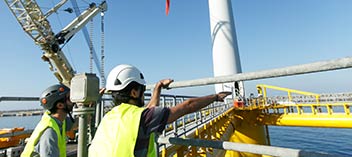Leading a Regional Industry
Collaborating with Atlantic states and the federal government.
With its central location among the U.S. northeastern and mid-Atlantic states and the largest commitment to offshore wind in the nation, New York plays a leadership role in seeding and cultivating a new industry for the region. Through interstate coalitions, the offshore wind Technical Working Groups, and a new regional science body, states are taking steps to share information, identify cross-boundary stakeholder considerations, and conduct research to ensure a coordinated, proactive approach to offshore wind development.
A Regional Perspective
Harnessing a Strong Resource
According to the U.S. Department of Energy, U.S. offshore wind has a technical resource potential of 2,000 gigawatts of capacity ![]() . Analyses show that the average wind speeds off the northeastern and mid-Atlantic coast provide tremendous generation potential. New York is eager to take advantage of this plentiful resource to transition away from conventional generators that emit harmful greenhouse gases and work toward clean, renewable generation sources, such as offshore wind.
. Analyses show that the average wind speeds off the northeastern and mid-Atlantic coast provide tremendous generation potential. New York is eager to take advantage of this plentiful resource to transition away from conventional generators that emit harmful greenhouse gases and work toward clean, renewable generation sources, such as offshore wind.
More Resources:
- National Offshore Wind Strategy
 (U.S. Department of Energy, U.S. Department of Interior) and Supporting Technical Reports
(U.S. Department of Energy, U.S. Department of Interior) and Supporting Technical Reports 
- Wind Energy Maps and Data
 (U.S. Office of Energy Efficiency & Renewable Energy)
(U.S. Office of Energy Efficiency & Renewable Energy)
State Policies Drive Action
New York is not alone in promoting policies to drive the growth of the offshore wind industry. States along the Atlantic coast are setting ambitious goals for offshore wind procurement in order to advance a clean energy future.
For the latest news about offshore development in other Atlantic states, visit these webpages:
- Connecticut Department of Energy & Environmental Protection

- Maryland Energy Administration

- Massachusetts Clean Energy Center (MassCEC)

- New Jersey’s Clean Energy Program

- Rhode Island Office of Energy Resources

- Virginia Offshore Wind Development Authority

Coalitions Promote Progress
To help accelerate the responsible growth of offshore wind in the U.S., national and regional nonprofits are working to collaborate across federal and state boundaries, facilitate discussions between the global industry and local supply chains, host events, aggregate industry news, advertise job opportunities, and conduct research to bridge knowledge gaps and reduce technology costs and market barriers.
- The Business Network for Offshore Wind

- American Wind Energy Association

- The National Offshore Wind Research & Development Consortium

- The Special Initiative on Offshore Wind

Where can offshore wind be built?
The Federal Government and Siting Offshore Wind
Atlantic states are working hard to develop offshore wind as a large-scale, clean generation source for our electricity grids, but who decides where the wind projects can be built?
The federal government is responsible for determining which areas of the ocean are suitable for offshore wind development and for permitting offshore wind projects within these areas. The Bureau of Ocean Energy Management (BOEM) within the U.S. Department of Interior is responsible for these activities.
Learn More
-

Siting Offshore Wind
Understand the Bureau of Ocean Energy Management (BOEM) process for determining where offshore wind development can occur.Read More Siting Offshore Wind
